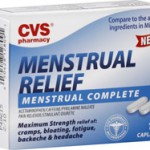FDA Tells Prescription Sleep Aid Manufacturer to Remove TV AD
 I don’t usually blog about prescription drugs, I’d much rather talk about herbs, especially Chinese herbs. But in this case, I consider this more of a “Public Service Announcement”. Most of my readers have strong feelings against taking any pharmaceutical drugs and have an inherent mistrust of drug companies. Here’s another reason why a growing segment of the public feels they can’t trust the drug companies or their TV commercials.
I don’t usually blog about prescription drugs, I’d much rather talk about herbs, especially Chinese herbs. But in this case, I consider this more of a “Public Service Announcement”. Most of my readers have strong feelings against taking any pharmaceutical drugs and have an inherent mistrust of drug companies. Here’s another reason why a growing segment of the public feels they can’t trust the drug companies or their TV commercials.
June 17, 2010: According to Carrie Newcomer, a Regulatory Review Officer at the FDA, Division of Drug Marketing, Lunesta, a prescription sleep medication made by Sepracor, has made an “unsubstantiated superiority claims” in a TV commercial. According to the FDA’s letter to Sepracor. “Promotional materials are misleading if they represent or suggest that a drug is safer or more effective than another drug, when this has not been demonstrated by substantial evidence or substantial clinical experience.”
The FDA’s has reviewed a 60 second commercial and has sent a warning letter to Sepracor to immediately cease the dissemination of violative promotional materials for Lunesta. This drug has “warnings which include abnormal thinking and behavior (e.g., aggressiveness, bizarre behavior, agitation, hallucinations, depersonalization), complex behaviors (e.g., “sleep-driving,” preparing and eating food, making phone calls, and/or having sex, with amnesia for the event), worsening of depression in primarily depressed patients including suicidal thoughts and actions.”
“Patients should be cautioned against engaging in hazardous occupations requiring complete mental alertness or motor coordination. Lunesta should not be taken with alcohol and can lead to abuse and dependence. The most common adverse reactions associated with this sleep aid includes unpleasant taste in mouth, headache, dizziness and morning drowsiness.”
All Natual Option for Sleep on Dr. Oz
 Americans are loving the TV personality, Doctor Oz. Why? He's become a source of easily understandable medical information. I appreciate that Dr. Oz brings up the subject of Alternative Medicine and alternative practitioners. I mean come on, Acupuncturists have been legal medical practitioners in California for some 30 years now. Nearly all states now have Licensed Acupuncturists (state license) or Certified Acupuncturists by a National Certification Commission.
Americans are loving the TV personality, Doctor Oz. Why? He's become a source of easily understandable medical information. I appreciate that Dr. Oz brings up the subject of Alternative Medicine and alternative practitioners. I mean come on, Acupuncturists have been legal medical practitioners in California for some 30 years now. Nearly all states now have Licensed Acupuncturists (state license) or Certified Acupuncturists by a National Certification Commission.
Recently the Dr. Oz show did a segment on alternative health for sleep problems. Doctor Oz brought on his show, Dr. David Katz to represent traditional medicine, Dr. Hyla Cass- an Integrative Medicine Specialist, and Dr. Maoshing Ni (or Dr. Mao) – a doctor of Chinese Medicine. Dr. Mao is author of Secrets of Self-Healing: Harness Nature’s Power to Heal Common Ailments, Boost Your Vitality,and Achieve Optimum Wellness and Second Spring: Dr. Mao’s Hundreds of Natural Secrets for Women to Revitalize and Regenerate at Any Age. Dr. Hyla Cass is author of Eight Weeks to Vibrant Health: A Take Charge Plan for Women to Correct Imbalances, Reclaim Energy and Restore Well-Being.
In Dr. Mao's words a good night sleep can be had for those who learn how to bridge the mind and body gap. Dr. Mao has a breathing device that helps you reach a meditative state so that you can fall asleep.
Dr. David Katz talked about stress management and how that helps with sleep problems. Insomnia can be caused by anxiety disorders. Most MD's today will often send patients who cannot sleep to a formal sleep study so that things like sleep apnea and other disturbances in their sleep patterns can be detected.
Dr. Hyla Cass said that L-Tryptophan enhances serotonin, which helps you to sleep. Also, GABA which is a brain neurotransmitter that allows us to relax.
What Dr. Oz hasn't yet brought to his show is an expert to discuss Chinese herbal medicine. He skirted the issue a bit with Chris Kilham, The Medicine Hunter who made an herbal energy shake on the show. But I do believe that was as close as he came to discussing Chinese herbs or other herbs for health benefits. Dr. Mao is certainly more than qualified to discuss Chinese herbs, yet he didn't mention them for sleep aids even though he sells Chinese herb sleep aids in his clinic. These three experts Dr. Mao, Dr. Katz and Dr. Hayla all promoted falling asleep naturally without drugs. Quiet your mind, allow your body to relax and your release the stressed out state of anxiety. I'm surprised Dr Oz doesn't mention Chinese herbs can help you do all three of these suggestions. In fact, it's exactly what the herbs in iSleep Herb Pac help you accomplish.
I challenge Dr. Oz to go the next step and include some presentation on Alternative Medicine's on his show, not just Alternative Medicine Practitioners such as Acupuncturist. Surely he realizes that Traditional Chinese Medicine/Acupuncture also relies on the healing powers of Chinese herbal medicine?
How Herbs Work or Explaining The Human Genome
 Often people ask me how do you know herbs work? I often wish I had a one sentence answer. Sometimes I feel this answer is equal to explaining the human genome. Not every answer can be that simplified. Whether I'm being asked about the herbs in the Pac Herbs packets or about Chinese herbs or Western herb or South American herbs, the first clarification is what type of herbs are we discussing?
Often people ask me how do you know herbs work? I often wish I had a one sentence answer. Sometimes I feel this answer is equal to explaining the human genome. Not every answer can be that simplified. Whether I'm being asked about the herbs in the Pac Herbs packets or about Chinese herbs or Western herb or South American herbs, the first clarification is what type of herbs are we discussing?
Because my background in Traditional Chinese Medicine and herbs of Asia, I will refer to only "Chinese herbs" here. Plants or Chinese herbs have naturally grown in the wilderness of Asia since earliest recorded history. Because many are not the same species of plants as those found in North America many of these herbs are new to Americans. Mother Nature gives us an abundance of plants both for food and medicine on every continent. History tells us man has always used local plants for medicine and we still do. Even pharmaceutical drugs are based on chemicals found in nature.
Regardless, where a plants origin is, it's the historical use of herbs for healing that make the difference between knowing which herbs work and which do not. When we view hundreds of years of a specific plant or herb usage for a certain condition then we have a collective experience that is replicated over time. How do we know an herb works? Generations of mankind using the same plants or the same combinations of plants for the same illness with successful results proves this.
This is the short answer, the long answer gets more technical about the various chemical markers, constituents in each plant specie and processing and packaging that all impact the final product. This is why I mention, which is easier to answer, questions on the human genome or questions describing how and why herbs work. If your not satisfied with this short answer here. Check out a few other posts here and here which go into a bit more depth. Whatever answers you are looking for, it's clear that even modern medical analysis will never have all the answers on herbal medicine that history holds.
Sleep More For Natural Weight Loss
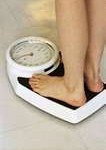 Scientists have known for years that sleeping more can actually help you lose weight. There are many studies to support this conclusion. One such study published in 2005 which included 8000 adults over several years found that less sleep corresponded to greater risks of weight gain. Is the answer to the American obesity problem in the bedroom? It's true that eating and sleeping cannot really occur at the same time.
Scientists have known for years that sleeping more can actually help you lose weight. There are many studies to support this conclusion. One such study published in 2005 which included 8000 adults over several years found that less sleep corresponded to greater risks of weight gain. Is the answer to the American obesity problem in the bedroom? It's true that eating and sleeping cannot really occur at the same time.
The American Journal of Clinical Nutrition studied a small group of men and women and measured their food intake over 48 hours periods. One period of time included 8 hours of sleep and another in which the participants slept only 4 hours. After the night of less sleep the men consumed more than 500 extra calories or approximately 22% more.
The University of Chicago did a similar study last year and and similar findings in both men and women. The less sleep the more calories eaten, particularly carbohydrates. Makes sense to me, when I haven't gotten a good nights sleep I tend to make up for my lack of energy with food. Some studies blame the gain on hormones. They argue decreased sleep creates a spike in ghrelin, a hormone that stimulates appetite and an increase in leptin, which signals satiety. But there seems to be no consensus yet. Regardless, sleep aids such as Chinese herbs can help you stay asleep and give you the rest you need, without side-effects or additional calories. Prescription sleep aids in comparison with placebo pills only provided 11.4 minutes of additional rest but then, that is a subject for another bog.
What do you think? Does a night of better sleep equal less food intake the next day?
http://www.ncbi.nlm.nih.gov/pubmed/18719052 Eur J Endocrinol. 2008 Dec;159 Suppl 1:S59-66. Epub 2008 Aug 21. Sleep and the epidemic of obesity in children and adults.
Farmers Market Surprise, Herbal Medicine For Grey Hair
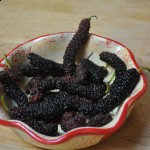 During my weekend farmers market stop I found a surprise hiding between the asparagus and the zucchini. A farmers table was filled with berries. Strawberries, blackberries, raspberries but then in a small inconspicuous container were . . . . . . . . . . . . . . . . . . . .
During my weekend farmers market stop I found a surprise hiding between the asparagus and the zucchini. A farmers table was filled with berries. Strawberries, blackberries, raspberries but then in a small inconspicuous container were . . . . . . . . . . . . . . . . . . . .
Read more:
mulberries. Not quite as appealing and certainly not as popular. Most folks kept asking "what are those"? They looked like a little basket of worms. Ah, but to a self proclaimed herbal medicine witch, a mulberry is much more than just a berry. It's a kidney tonic, prized for it's health benefits. To find these berries in Southern California is highly unusual. Mulberries need a bit colder climate and even then, mulberries are not easy to pick or transport as they don't have a very long shelf life.
I knew I had to have them that instant. At $6.00 a basket, they weren't exactly cheap, but then again the health benefits alone should make them much more expensive. But please don't tell the farmer that. In Chinese medicine, Sang Shen, or mulberries are blood tonifying herbs. They nourish our blood and our kidneys, especially our kidney yin which we deplete with age. This is what gives they a reputation as an effective premature grey hair herbal medicine. Mulberries also have a gently, yet effective laxative quality, as do many berries in any significant quantity. I'm not sure how many other berries grow on a tree like the mulberry, rather than a bush, but I believe it's fairly unusual.
The look on my families faces when I presented my prized possession was a little more like shock, rather than excitement. Their first response, was "What are those?" with an undertone of disgust. When I said "a Chinese herb, I mean berries", they all questioned my sanity and/or my truthfulness. They know whenever I say it's a Chinese herb and it taste good something must be amiss. But they all tasted and were all pleasantly surprised. Fresh mulberries are delicious, I had to stop the gorging just to get a quick picture, the small basket was gone in a flash. They were sweet, juicy and flavorful. I can truly say they might just be my new favorite berry masking as herbal medicine. This coming from someone who believes raspberries are heaven sent. I picked and ate literally thousands of raspberries growing up. Although, I once found wild blackberries on a golf course in Oregon and they were honestly amazing. I had to go back the next day to pick more. Fresh off the vine or tree in this case, definitely makes the difference with berries.
Wall Street Journal Reports on How Acupuncture May Work
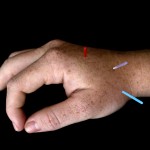 According to this report (connect here) in the Wall Street Journal today, "Despite acupuncture's 4,000-year history, little is known about the biological pathways that enable carefully placed needles to relieve pain in many patients." A study just published in Nature Neuroscience says the compound adenosine may be the reason acupuncture is an effective pain reliever. Adenosine has been known as an effective anti-inflammatory for years. We've also known adonosine plays an important part in energy transfers process or ATP. (adenosine triphospate).
According to this report (connect here) in the Wall Street Journal today, "Despite acupuncture's 4,000-year history, little is known about the biological pathways that enable carefully placed needles to relieve pain in many patients." A study just published in Nature Neuroscience says the compound adenosine may be the reason acupuncture is an effective pain reliever. Adenosine has been known as an effective anti-inflammatory for years. We've also known adonosine plays an important part in energy transfers process or ATP. (adenosine triphospate).
But how it's function as a pain reliever has been more shrouded. This recent study showed that performing acupuncture in mice triggers a release of adenosine in the tissues. Levels of adenosine, a neurotransmitter, rose 24-fold in the tissue fluid surrounding an acupuncture needle. Certainly more studies are necessary but this is the first in many possible insights explaining how this very ancient practice has some very real biological effects.
Anyone who has ever received an acupuncture treatment understands the calming, pain relieving effects a few extremely small needles, placed carefully in precise locations can make. It's hard to believe until you experience it for yourself. But after just 10 minutes the effects are so noticeable it hardly matters to any Acupuncturist enthusiast what the patho-physiological effects of the chemical transmitters are called that make the difference between pain and no pain. "As long as it works, that's all I need to know" said David, a client of mine for the past few years. David and millions of happy people can't possible be wrong.
(My client volunteered her hand for the picture above.)
Summertime Thirst Quencher Herb Teas
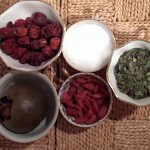 Summertime is upon us and it’s heating up out there. Forget the lemonade and the passion fruit ice tea, here’s two recipes with natural herbs for real thirst quenching. These are great for anyone who wants a cool, refreshing drink that’s packed with vitamins and heat relieving properties. These thirst quencher ice teas are healthier than sports drinks and vitamin waters and yet still taste good.
Summertime is upon us and it’s heating up out there. Forget the lemonade and the passion fruit ice tea, here’s two recipes with natural herbs for real thirst quenching. These are great for anyone who wants a cool, refreshing drink that’s packed with vitamins and heat relieving properties. These thirst quencher ice teas are healthier than sports drinks and vitamin waters and yet still taste good.
This tea is also greener!! Instead of buying and tossing those plastic (BPA ridden) bottles into landfills, you’re making a healthy fitness beverage. You may not know these Chinese herbs but you can easily find them in Asian markets or on the Internet. These teas have cooling properties to help keep you comfortable on those hot and humid summer days. If you’re exercising in the heat these teas are perfect to rehydrate the minerals you’re losing. It’s what you need in your water bottle for a bike ride, after a workout and in the refrigerator all summer long.
Regarding sweeteners, we know high fructose corn syrup and cane sugar is not so good for us. High fructose corn syrup is prevalent in juice drinks, sports drinks and processed foods so here’s some natural herbal options to sweeten these teas. These sweeteners will help diabetics control their blood sugar and won’t contribute to your kid’s cavities.
Naturals Sweeteners:
I love how easy it is to use Lo Han Sweet. Add a few teaspoons to a pitcher of tea for a healthy, low calorie sweetener. It’s made from ½ Xylitol and ½ Chinese herb extract called Longevity fruit. It looks a little like Splenda’s consistency but much safer. My other sweetener choices would be Stevia or pure Xylitol. Be sure to buy Xylitol, a sugar extract, that is made from non-gmo corn. It resembles sugar but has a third less calories and is great for diabetics. Another option is boiling 1 Longevity fruit, (lou han guo) in a quart of water. The water will be super sweet and you can add this to your tea to taste.
Mint & Chrysanthemum Tea – Makes 10-15 cups
1 cup – Mint leaves – Dried or fresh. In Traditional Chinese Medicine mint is used to clear heat from the head and eyes. It’s cool nature helps relieve heat rashes and headaches. This Chinese herb you are sure to know and recognize but you probably didn’t know it also relieves irritability and but not recommended for nursing mothers.
1 cup – Dried Chrysanthemum flowers (Chinese grocery stores sell this or buy on line.) Chrysanthemum, another popular Chinese herb, has been used throughout Asia for centuries to reduce fevers, headaches and red swollen dry eyes.
Directions:
Boil 4 cups of water. Remove from heat and place herbs in water to steep for at least 10 minutes. Strain out herbs and add a few extra mint leaves for taste. Add additional 6 cups of water or ice. Use above sweetener to your desired taste. You may want to use 1 cup of the Longevity fruit sweetener water to taste.
Pink Berry Cooler Tea – Makes 10-15 cups
1 cup – Gou Ji Berries and/or Red dates – Both of these can be found at most Chinese markets and now some health food stores. Use about 1 cup of either or ½ cup of both. Both are great blood tonics , packed with vitamins and minerals and add a nice natural sweet flavor to any tea.
1-2 cups Watermelon – You can use both the melon and the white rind. But what you really need here is only the white rind. But, don’t cut too close to the green skin because the taste will get more bitter the closer you get. You’ll want to puree the watermelon with a little of the warm water from cooked berries above, before adding it to the other ingredients. Watermelon rind has the best cooling properties of just about any melon and has been used in Chinese medicine for generations.
2 cups – Aloe Vera Juice – Buy it by the gallon. It’s cheaper and goes a long way. This is an herb used for centuries and is well known for it’s cooling properties. It’s great for constipation, irritability and red eyes. Add the aloe to the mixture at the end. I find aloe to be fairly bland tasting so it can be hidden with other flavors easily.
Directions:
Boil 3 cups of water. Turn to a simmer and add gou ji berries and red dates. Simmer for 15 -20 minutes. Allow to cool. Strain out herbs. Add the aloe juice and watermelon juice. Add additional 5 cups of water or ice. Use above sweetener to your desired taste.
For a little zing add some sparking water before drinking to either tea or a splash of rose water. (You can usually find rose water in glass bottles in most ethnic markets as well as the Chinese herbs listed above.)
You can see Chinese herbs are not really all that exotic and foreign. 5 out of 6 Chinese herbs mentioned here you have probably heard of before. A little understanding about what to eat and drink when the weather is too cold or too hot can make a big difference in your health.
FDA Says Sleep Aids Have Not Proven Effectiveness
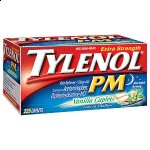 It’s only taken 15 years. The head of the FDA’s office of Nonprescription Products, Dr. Charles Ganley, sent a letter (released May 5, 2010) to the Consumer Healthcare Products Assoc. or CHPA on Feb 16, 2010 stating, “There is an insufficient basis to support the combination of acetaminophen and diphenhydramine as a nighttime sleep aid for relief of occasional sleeplessness when associated with minor aches and pains”.
It’s only taken 15 years. The head of the FDA’s office of Nonprescription Products, Dr. Charles Ganley, sent a letter (released May 5, 2010) to the Consumer Healthcare Products Assoc. or CHPA on Feb 16, 2010 stating, “There is an insufficient basis to support the combination of acetaminophen and diphenhydramine as a nighttime sleep aid for relief of occasional sleeplessness when associated with minor aches and pains”.CAUTION ADVISED When using Acetaminophen, Herbs are a safer alternative
Usually I write about Chinese herbs, but today’s a brief diversion on a compelling topic.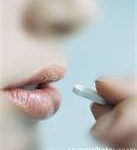
If you’re like most Americans your medicine cabinet is stocked full of over-the-counter medicine (OTC) and probably at least a few prescription medications. But did you know that taking OTC acetaminophen can be poisonous and can cause serious liver damage. UCLA experts warn that combining many pharmaceutical drugs such as vicodin and percocet for pain with an OTC cold and flu medicine can be a deadly liver cocktail. New data is just surfacing because liver transplants are hitting an all time high in the U.S. Turns out the number one cause of liver damage is acetaminophen poisoning from long term overdosing.
We know you didn’t mean to overdose but did you realize more than two extra strength tablets or 650 milligrams daily is the U.S. FDA recommended dose? This lower and safer dosage was recommended by the FDA’s own advisory board in June 2009, but this recommendation has yet to be acted on as of this publishing date.
Are you using Tylenol®PM as a sleep aid or Tylenol® extra strength for menstrual cramps? You may be causing liver damage. It’s seems negligent of the manufacturers to withhold this information, it certainly has not been widely publicized. Labeling laws have been slightly modified (if you read the extra small print on packages) but you are not going to hear this information on TV or a radio commercial.
If your prescription drugs have the abbreviation “APAP” on the label, the medicine contains acetaminophen, and may cause liver damage. (But not all drugs are marked so check with you pharmacist.) If your taking any combination of over-the-counter drugs and prescription drugs containing acetaminophen, you may cause liver damage. If you add alcohol to this mix you are certain to cause liver damage and your poor liver will need to check into a rehab facility for some serious down time.
Not to be flippant about the very serious side effects of acetaminophen but if you combine any OTC sinus caplet, cold and flu formula, a pain reliever, Sudafed®, Excedrin®, Tylenol®, Pamprin®, Benadryl®, Premsyn®, CVS® decongestant, Eckerd® Pain relief, Thera flu ®cold packets, Vicks® DayQuil or NyQuil, arthritis pain relief caplets (just to name a few) together on any given day your most likely going over the recommended/safe zone for acetaminophen. You guessed it, more liver damage.
Take a vacation from the OTC medicines and get yourself some all natural 100% safe Chinese herbs. You’ll feel better and your liver will thank you.
- Aug. 13, 2010 LA Times Reports Tylenol linked to Asthma in Teens
- Herbs treat acetaminophen liver damage.
- http://www.nlm.nih.gov/medlineplus/druginfo/meds/a681004.html
Wisconsin Ginseng Crop Damaged Due to Snow in May
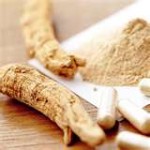 Typically, May weather in Wisconsin is wet, but not below freezing. This was not the case on May 7, 2010 in Marathon County when it snowed 3-4 inches in 24 hours. The freezing temperatures have likely killed all the newly planted Ginseng.
Typically, May weather in Wisconsin is wet, but not below freezing. This was not the case on May 7, 2010 in Marathon County when it snowed 3-4 inches in 24 hours. The freezing temperatures have likely killed all the newly planted Ginseng.
American Ginseng, also known as Panax quinquefolius, is a highly sought after Chinese herb used for centuries. It is the root of this herb that is used medicinally. Wisconsin depends on American Ginseng for over 15 million dollars each year and the freakish weather is estimated to have killed or damaged up to 80% of the new crop. The cold weather snap effects the recently planted seedlings the hardest and may seriously drive up prices.
Much of the harvest is exported to Asia where it fetches higher dollar values than in America. Asian cultures have used Ginseng for it's medicinal values for over 2000 years. Used commonly to ward off colds & flu's, ginseng is also known for it's anti-cancer properties and research shows it reduces blood sugar in people with diabetes. The Ginseng Board of Wisconsin has a very nice website with more information.
The crop normally takes 4 years to mature. Chinese herbs like American Ginseng are also grown in other parts of the U.S., mainly the woods of Kentucky and North Carolina. So, depending on how much Wisconsin Ginseng can be salvaged, the supply in the coming years may or may not be severely effected by Mother Nature's temperament. Many Chinese herbs grown in China have seen price increase due to Mother Nature. An ongoing drought in China has effected another specie of Ginseng, and has already driven up prices as much as 300% this year alone.

